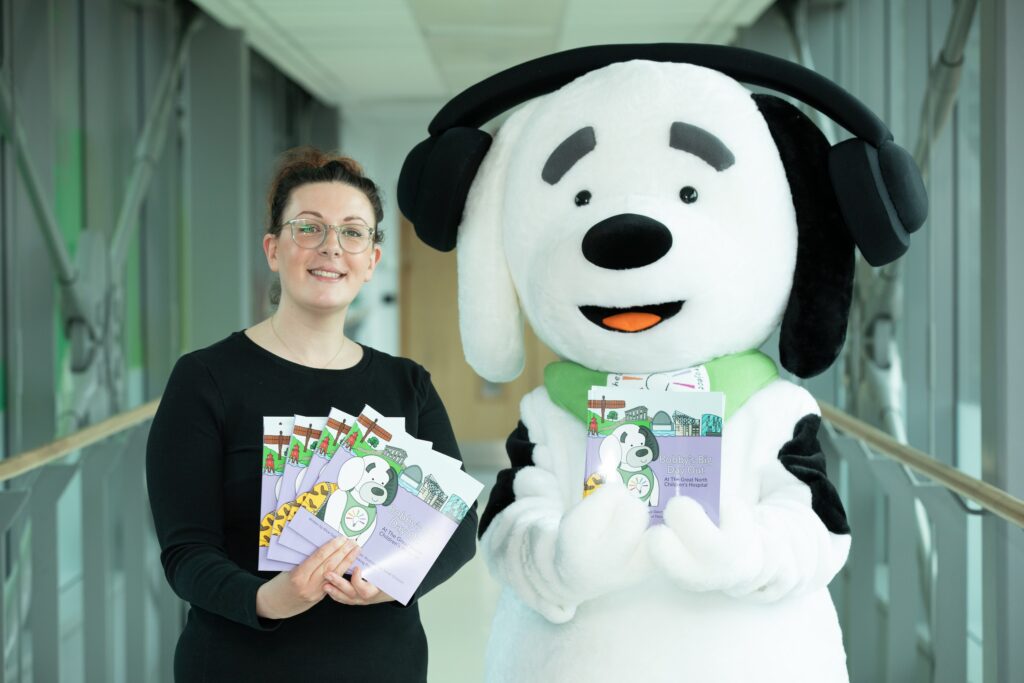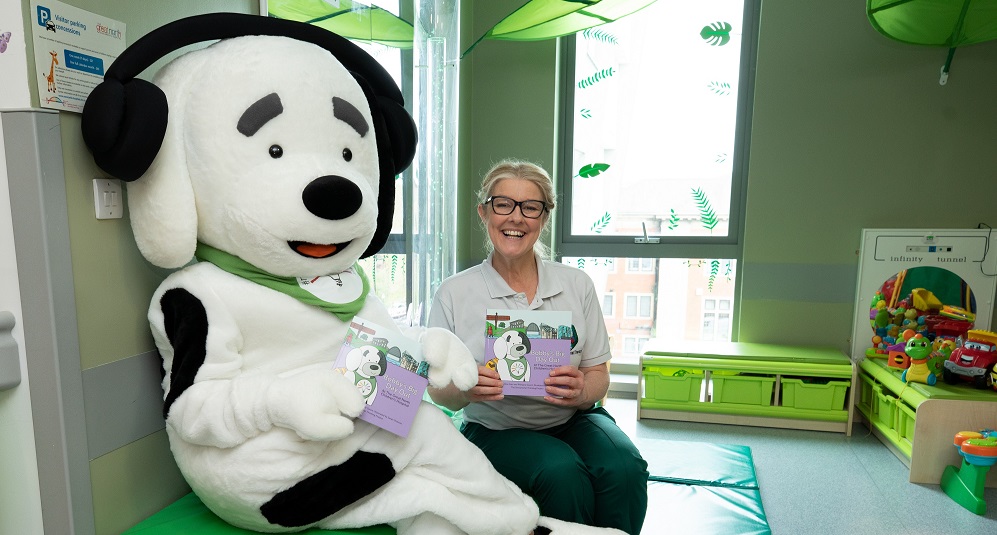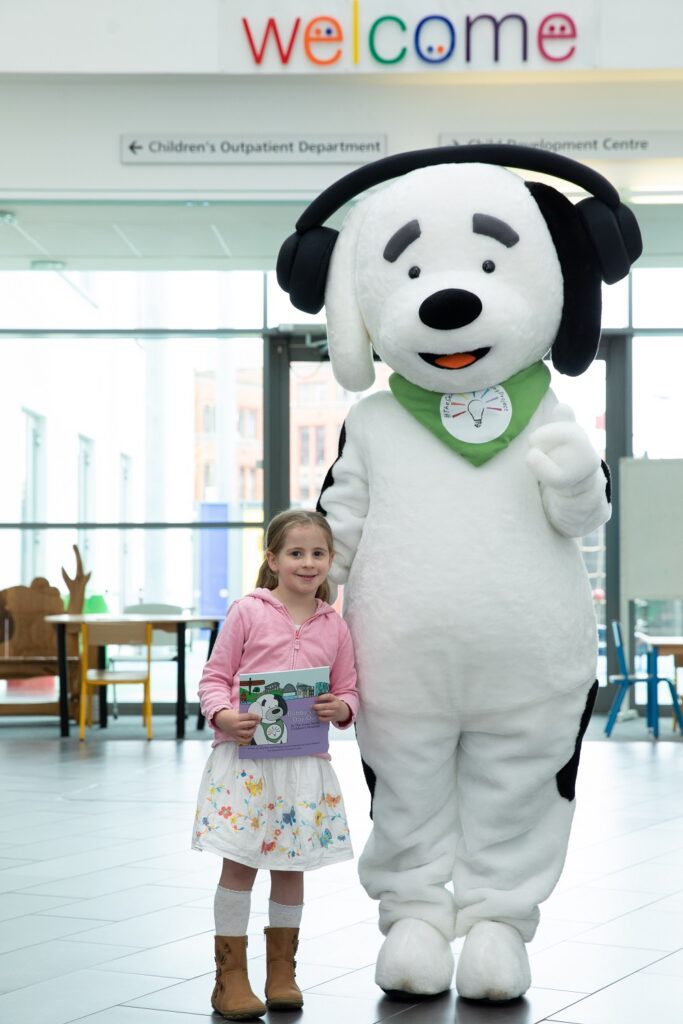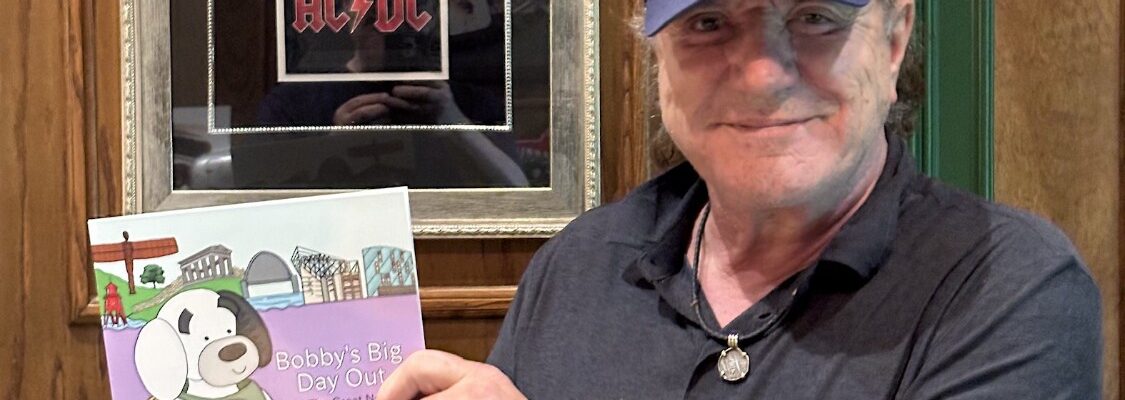‘Bobby’s Big Day Out‘ is a short-illustrated story following children’s occupational therapy mascot Bobby and his mum as they visit the hospital in Newcastle.
Written by occupational therapist Alice Gair and Dr Philippa Gaunt, with illustrations by Sarah Dickson, the book was jointly funded by The Great North Children’s Hospital Foundation – part of Newcastle Hospitals Charity – and the Newcastle United Football Club players, and is part of The Sensational Thinking Project.

Founded in 2018 by Newcastle Hospitals’ children’s occupational therapy team, the project supports children and families living with sensory processing differences.
Advanced occupational therapist and Sensational Thinking Project lead, Cheryl Gascoigne, said: “Bobby’s Big Day Out aims to raise awareness of sensory challenges faced by some children and young people when coming into hospital.
“It’s designed to be fun and engaging and shows how Bobby uses sensory strategies to have a successful experience.
“Unfortunately, not all children are able to access the book in written format which is when Brian kindly stepped in to record an audio version.
“He was an obvious first choice due to his relatable authentic Geordie accent and captivating gravelly voice and it’s amazing he was able to help us in this way.”

Helping children with sensory differences

On narrating the book Brian says “Reading the book for the Sensational Thinking Project, supported by the Great North Children’s Hospital Foundation – part of Newcastle Hospitals Charity – was a real pleasure.
“I was delighted to be asked and it’s great to be involved in something that can hopefully help children before coming into hospital, especially one in my home town.”
Listen to Brian read Bobby’s Big Day Out on our YouTube Channel
Bobby – whose name was chosen by children who attend the hospital – is now very much part of the team. His colours are representative of Newcastle United Football Club and he wears ear defenders.
Cheryl adds “We know from feedback from families that this book is helping children preparing to come into hospital and it provides an ideal opportunity to discuss upcoming appointments.”
My child loves all the regional landmarks in the book and likes to show his friends that this is the hospital that he comes to.
My daughter really likes Bobby and finds him so relatable; she also wears ear defenders. She brings her book with her to every appointment.
It will really help having the audio version of the book available online, my son is non verbal and often uses a tablet to listen to stories. It is fantastic it is being read in a regional accent.
Helping children anticipate what to expect when coming into hospital
Emma Talbot is an occupational therapist technical instructor with two young daughters 12-year-old Poppy and Belle, who is 6. They are both under the care of specialist teams at the RVI’s Great North Children’s Hospital and have been regular visitors for hospital appointments and procedures over the last eight years.
Poppy has cholesteatoma – a rare condition where a cyst-like growth of skin cells develops deep in the ear which can cause damage including hearing loss – and has had to have a number of investigations which she has worried about.

In addition, her hearing loss means that she can struggle with large open noisy environments like hospitals as she is sensitive to loud/unusual noises and the echo effect in large open spaces can exacerbate this.
Belle has recurring bacterial bronchitis – one of the most common causes of chronic cough in children which has a huge impact on her life. She has also had several investigations such as bronchoscopy, endoscopy and CT scans which can cause a lot of anxiety as she anticipates what might happen during these procedures.
“I believe coming to the hospital can be very overwhelming for any child, not knowing what to expect or what may happen when they’re there,” said Emma.
“Talking to your child in an open, honest and age appropriate way about their hospital care helps to relieve any anxiety they might be feeling. I think that having a book like this to read to your child will give parents the opportunity to open the conversation with their child about the hospital and what to expect.”
Innovative support
The trust’s innovation team also worked closely with Alice, Cheryl and the wider team to provide support and guidance for the rollout of the book including project management and specific tailored support such as sourcing local printers, financial oversight and legal advice relating to book’s copyright ahead of its publication.
Business innovation manager, Charlotte Fox, said: “We’re excited to see Bobby’s Big Day Out launch for children and families. It has been a fantastic collaborative project and really rewarding to have worked together to make a difference to them.
“The book is a unique resource for autistic children and those who experience sensory processing differences or who are nervous or worried about coming into our hospitals. We hope that it helps support them to feel safe and comfortable ahead of their visit.”
Newcastle Hospitals Charity

The Great North Children’s Hospital Foundation, part of Newcastle Hospitals Charity, supports the many children and their families who come to our hospital for treatment and care, making their hospital experience the best it possibly can be.
The Foundation supports life changing research, cutting-edge equipment and technology and projects to make the hospital more welcoming for children.
Newcastle Hospitals Charity is the official charity for Newcastle Hospitals, which includes the Royal Victoria Infirmary, the Freeman Hospital, the Northern Centre for Cancer Care and many community services.
Our charity’s mission is to help our hospitals to go further by providing support for compassionate and innovative healthcare, education, and research.
We work in partnership with Newcastle Hospitals to complement the world-class healthcare services provided and we proudly support patients, staff, and the wider hospital community by funding a range of initiatives – from cutting-edge cancer research to staff psychological support and vital improvements to the patient experience and environment.
